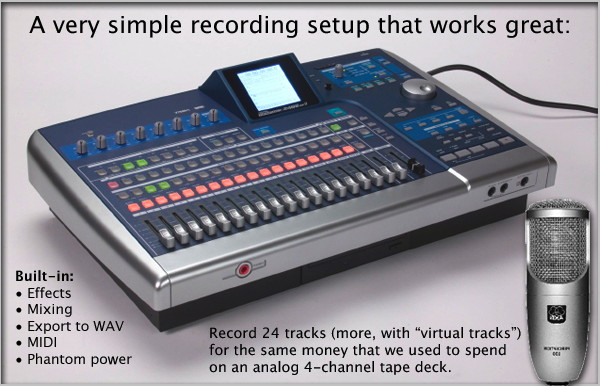Recording - Equipment
It doesn't cost millions...

The Tascam 2488mkII
I've been using this Tascam/AKG setup, and it works very well. It even includes a built-in CD burner.
Today, you can buy an excellent 24-bit (better than commercial CD quality) handheld-size stereo digital recorder, for less than $500. If all you want to hear is a straightforward live recording, perhaps from different vantage points in the room, it's a handy tool. Most of them allow for plugging in 2 or more microphones and/or 2 or more line inputs. Some have both, so you can use a "board mix" and still mix it with 2 microphones out front. You probably will have to buy a bigger memory card, if you want to record much.
Obviously, use the best recording equipment you can. If you're going to make any real judgments about your music, then quality is hugely-important. If you use an inexpensive camcorder, a cassette deck, a micro-cassette recorder, etc., you'll get results that probably can't be judged correctly. It might not sound anything like your actual band. You can borrow or rent equipment, if you don't want to buy it. Today, I believe that digital recording (no tape) is best, based on years of recording with a mini-disk recorder, and now, with a hard drive recorder.
Microphones are one of the most important considerations, so don't just casually throw a vocal microphone on the bass drum, for example. Try an AKG D-112 sometime, and you'll never go back. Record your other drums with simple vocal microphones, then try it with a couple of nice Sennheiser 421's and again, you'll never go back. What you'll appreciate most is realism. Use microphones that accurately record the frequencies you're generating! Depending on your recording equipment, the microphones may be more important than what they're plugged into.
"Tracks" versus "Channels".
If you haven't done much recording, then be aware that "Tracks" are different from "Channels". "Tracks" are discrete parts of the recording that reside on the machine separate from everything else. "Channels" on the other hand are simply where these various "Tracks" are ultimately assigned. There might be more than one "Track" that leads to the same "Channel". A simple example is the idea of using one microphone out front (one "Track") that ultimately would be heard on both the left and right "Channels".
"Complex" doesn't necessarily mean "better". As you become more involved in recording, you may want more microphones and/or direct inputs, so you can have more control (after the recording) over the details, including balance, tone, effects, etc.. Other times, a simple one or two-microphone setup, in front of a live band, can produce very satisfying results. You might collect enough good material to make a nice CD. If you want complete control over the mix, effects, etc., then it's best to place the inputs on discrete tracks. You can then make very clear objective judgments about the music, and correct many of them without rerecording. One thing leads to another... All these listening sessions help you sound better, without editing and effectswhich is the whole point.
So, use recording equipment that has as many tracks as you need, with a few extras, just in case. If you don't have many tracks available, create a "board mix" from your PA mixer, and combine that onto a separate track. In my case, I chose a Tascam 2488mkII, and a single AKG "Perception 100" (phantom-powered) microphone, to start. All of the "Guest Artist" recordings on my Latest Recordings page were made with this simple setup, and the quality is quite good, even when the original 24-bit WAV files were converted to MP3's for the web. (photo at the top of this page)
How complex does it need to be?
Do you or your band really need compressors, gates, digital delay, and other special effects, to sound "normal"? I don't consider any of these things to be "bad", but for my particular needs, they aren't required. (Typically, a small amount of reverb is the only effect I'll use.) If you feel that you need more, then your recordings will be more complex to record and mix, and they'll be more expensive. Another thing to consider is that if you depend on these special effects to sound good, then what will you do when they're not available? If simple works for you, then read on...
- Mike James